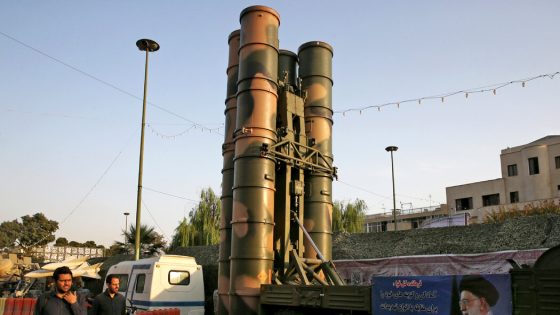An Israeli airstrike on Iran on Friday damaged an air defense system, according to Western and Iranian officials, in an attack calculated to deliver a message that Israel could bypass Iran’s defensive systems undetected and paralyze them.
The strike damaged a defensive battery near Natanz, a city in central Iran that is critical to the country’s nuclear weapons program, according to two Western officials and two Iranian officials. The attack — and the revelation on Saturday of its target — was in retaliation for Iran’s strike in Israel last week after Israel bombed its embassy compound in Damascus. But it used a fraction of the firepower Tehran deployed in launching hundreds of drones and missiles at Israel.
The strike on Friday was the latest salvo in a series of tit-for-tat attacks between the two countries this month that have heightened fears of a broader regional conflict. But the relatively limited scope of Israel’s strike and the muted response from Iranian officials seem to have eased tensions.
Iran and Israel have conducted a yearslong shadow war, but the conflict intensified on April 1, when Israeli warplanes killed seven Iranian officials, including three senior commanders, at an Iranian diplomatic compound in Syria, which Israel asserts was used as a military site. Iran responded last week by firing a barrage of drones and cruise and ballistic missiles at Israel, almost all of which were shot down by Israel and its allies. But the strikes nevertheless rattled Israelis.
That attack was Iran’s first-ever direct assault on Israeli soil, thrusting the countries’ clandestine warfare — long fought by land, air, sea and cyberspace — into open view. The Israeli government vowed to respond, even as world leaders and Western allies, including the United States, rushed to de-escalate the situation, urging Israel not to respond in a way that could lead to a regional war.
Though Israel’s leaders came close to ordering a more extensive attack on Iran, the Friday attack appeared calibrated to send a warning about Israel’s military capabilities — but without further raising tensions as Israel continues to fight Hamas in Gaza.
The two Iranian officials who discussed the Israeli attack said that Israel had struck an S-300 antiaircraft system at a military base in the province of Isfahan. The officials’ account was supported by satellite imagery analyzed by The New York Times, which showed damage to the radar of an S-300 system at the Eighth Shekari Air Base in Isfahan.
It was unclear precisely what sort of weapon struck the S-300 system. Three Western and two Iranian officials confirmed on Friday that Israel had deployed aerial drones and at least one missile fired from a warplane. Previously, Iranian officials had said the attack on the military base had been conducted by small drones, most likely launched from inside Iranian territory.
Two Western officials said that a missile was fired from a warplane far from Israeli or Iranian airspace, and that the weapon included technology that enabled it to evade Iran’s radar defenses. The two Iranian officials said the military had not detected anything entering the country’s airspace on Friday, including drones, missiles or aircraft.
The efforts to ratchet down tensions between Israel and Iran played out as Israel’s war against Hamas, now in its sixth month, continued on Saturday with reports of a deadly assault in southern Gaza.
Israeli airstrikes in Rafah on Saturday killed at least 10 civilians, including women and children, according to Palestinian state media, sending fear through an area where more than a million Palestinians have been displaced.
Palestinians have been bracing for weeks for an Israeli ground offensive on Rafah, the southernmost part of Gaza, where a majority of the strip’s 2.2 million residents have fled after being forced from their homes. Israel’s bombardments and ground invasion have killed more than 30,000 people, according to local officials.
The Israeli airstrikes on Saturday hit two homes, and missiles and artillery struck other areas of Rafah and the surrounding area, according to the Wafa News Agency. The Israeli military did not immediately comment on the strike.
“It was like an earthquake,” Mohammad al-Masri, 31, said of the shaking from the strikes.
The first strike hit just past midnight, and the second one soon after, said Mr. al-Masri, an accountant who was sheltering with his family in a tent in a large encampment in Rafah.
“When we hear these strikes, we don’t know what to do,” he said. “Everyone is saying the same thing: ‘Where can we go?’”
Prime Minister Benjamin Netanyahu has said that Israel’s military plans to invade Rafah to “complete the elimination of Hamas’s battalions” and destroy its tunnel networks. World leaders, including President Biden, have urged Israel not to invade the city because of the risks of heavy civilian casualties.
About 500 miles away, Ismail Haniyeh, the political leader of Hamas, traveled to Turkey on Saturday to meet with President Recep Tayyip Erdogan, who has strongly condemned Israel and its leaders since the war began in October.
Turkey was once Israel’s closest friend in the Muslim world, but the relationship has grown increasingly turbulent since Israel’s invasion of Gaza. Mr. Erdogan has backed the Palestinian cause, which has widespread public support in Turkey, defended Hamas since the Oct. 7 attack and strongly condemned Israel and its leaders.
On Saturday, Mr. Erdogan’s office said the two leaders had discussed Israeli attacks against “Palestinian land, primarily against Gaza; what is needed to be done for the humanitarian aid to reach Gaza adequately and without interruption.”
After the meeting, Mr. Erdogan told reporters he would use every opportunity to draw attention to the suffering in Gaza, and that he hoped Israel would eventually be held accountable.
“Israel will certainly pay the price of the atrocities it has been inflicting on Palestinians one day,” Mr. Erdogan told reporters.
Earlier on Saturday, one person was killed and eight were injured in an explosion at a military base in Babylon Province, Iraq, that was used by an Iranian-backed armed group, Harakat al Nujaba, according to Iraq’s military command.
No one immediately claimed responsibility for the strike.
In a carefully worded statement, Iraq’s military did not attribute the explosion to an air attack with a missile or a drone. Privately, however, military officials said it appeared that at least one projectile had hit inside the perimeter of the base. A video taken shortly after the blast and posted on social media showed damaged buildings and a large crater filled with rubble. A second video showed several parts of the base on fire.
The U.S. military, which has previously carried out strikes on Iranian-backed armed groups in Iraq, said in a statement shortly after the attack that it had not participated in strikes on any locations in Iraq. The Israeli military declined to comment.
Liam Stack, Raja Abdulrahim and Alissa J. Rubin contributed reporting.
Source Agencies



